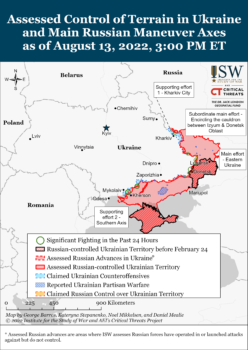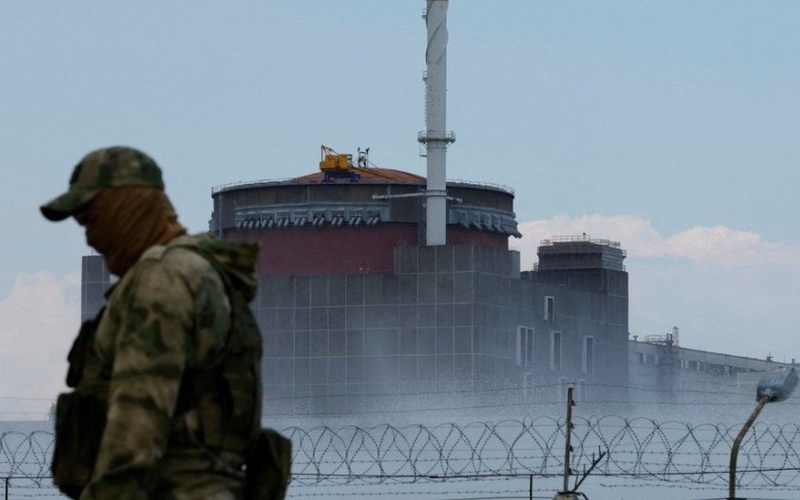The Zaporizhzhia nuclear complex in southern Ukraine, occupied by Russian forces in the first days of their February 24 invasion
“Russia Plans to Disconnect Zaporizhzhia Nuclear Plant From Ukraine Electricity Grid”
Thursday’s Coverage: Russia Strikes Kill 25+ on Ukrainian Independence Day

Source: Institute for the Study of War
UPDATE 1156 GMT:
The Zaporizhzhia nuclear power plant has been reconnected to Ukraine’s electricity grid.
State nuclear company Energoatom said one reactor at the plant has been reconnected to the grid and is building up capacity.
An administrative worker at the plant:
Yesterday there was no electricity, no water, nothing. But everything is already ok, the men at the NPP [Nuclear Power Plant] are just smarties and heroes.
The worker said, “Shelling around the station and the city, smoke from fires, dust from the ash dump of a thermal power plant…[means the] situation sometimes looks like the end of the world”.
UPDATE 0751 GMT:
Ukraine’s state nuclear company Energoatom says the six reactors of the Zaporizhzhia nuclear plant in southern Ukraine are still disconnected from the electricity grid.
The company said power for the plant is being supplied through a back-up power line, with ongoing work to restore grid connection to two functioning reactors.
UPDATE 0736 GMT:
A court in Russia’s Yekaterinburg restricted internet access and freedom of movement for former mayor Yevgeny Roizman on Thursday.
Roizman was seized in his apartment in Yekaterinburg, Russia’s 4th-largest city, on Wednesday. He was charged with “discrediting the military” over his criticism of the Russian invasion of Ukraine.
Roizman was allowed to leave detention. However, he is prohibited from using any means of communication, including the internet, and attending public events.
UPDATE 0730 GMT:
US banking giant CitiGroup is exiting Russia.
The firm confirmed Thursday that it is winding down consumer and local commercial business, affecting 2,300 employees.
Citi announced a plan to halt Russia consumer banking in April 2021 as part of a restructuring of business in 14 markets across the world. In March, Citi expanded its Russia plans to include a cut-off of local commercial banking.
UPDATE 0720 GMT:
The latest Russian attacks across the Donetsk region in eastern Ukraine have killed two civilians and wounded six.
Governor Pavlo Kyrylenko said the fatalities were in Siversk and Zelenopillia.
UPDATE 0657 GMT:
UK military intelligence summarizes that Russian Defense Minister Sergey Shoygu is covering up difficulties with Russia’s offensive in eastern Ukraine.
Shoygu claimed on Wednesday at a Shanghai Cooperation Organization meeting, “Everything is being done to avoid casualties among civilians. Of course, this slows down the pace of the offensive, but we are doing this deliberately.”
The UK analysts respond:
This is almost certainly deliberate misinformation. Russia’s offensive has stalled because of poor Russian military performance and fierce Ukrainian resistance. Under Shoigu’s orders, the forces operating in Ukraine have repeatedly missed planned operational timelines.
The UK report assesses, “It is highly likely that Shoigu and President Putin have fired at least six generals for not advancing quickly enough.”
UPDATE 0648 GMT:
Yale University researchers have identified 21 Russian “filtration centers” to detain and interrogate Ukrainian prisoners of war and civilians, often forcibly transferring them to Russia.
Focusing on the Donetsk region in eastern Ukraine, Yale’s Humanitarian Research Lab uses commercial satellite imagery and open-source information to identify the centers with “high confidence”. The sites include former schools, markets, and regular prisons. A possible grave at one prison complex has been located.
Ukrainian officials say up to 2 million people — including hundreds of thousands of children — have been moved to Russia. Those who have been able to return to Ukraine have spoken of abuse and torture at the centers.
ORIGINAL ENTRY: President Volodymyr Zelenskiy has noted how Russia’s occupation of the Zaporizhzhia in southern Ukraine brought the world close to “radiation disaster”.
On Thursday the complex, Europe’s largest with six of Ukraine’s 15 reactor, was cut off from power for the first time in 40 years.
The last power lines were briefly down after fires in ash pits from shelling of a nearby coal power station, which Zelenskiy blamed on the Russian occupiers who seized the site in early March.
Power was restored later Thursday with back-up diesel generators.
Zelenskiy summarized:
Today, for the first time in history, the Zaporizhzhia nuclear power plant stopped. The emergency protection of the power units worked —
after the last working line of the plant’s supply to the Ukrainian power system was damaged by Russian shelling.If our station staff had not reacted after the blackout, then we would have already been forced to overcome the consequences of a radiation accident.
Russia has put Ukraine and all Europeans in a situation one step away from a radiation disaster.
Hours before the episode, the head of Ukraine’s nuclear power agency had warned that Russia was seeking to disconnect Zaporizhia from the Ukrainian electricity grid, using the shelling and risking the power supply to create the conditions.
See also “Russia Plans to Disconnect Zaporizhzhia Nuclear Plant From Ukraine Electricity Grid”
Zelenskiy reiterated that officials from the International Atomic Energy Agency must be able to inspect the complex and speak to the Ukrainian workers.
UN Secretary-General António Guterres and IAEA head Rafael Grossi have also called for urgent access. Russian officials, while saying they would permit the mission, have stalled for weeks by setting conditions and refusing to demilitarize with the withdrawal of troops, vehicles, and equipment.
Grossi said on Thursday that the IAEA is “very, very close” to a visit, hoping it will be carried out within “days”. Ukrainian officials said an inspection will be arranged by early September.
After confirmation of the power cut-off and restoration, Grossi said, “We can’t afford to lose any more time.”
Zelenskiy also spoke of Russia’s “energy blackmail”, limiting or cutting off supplies to Europe, and how it would fail:
If someone in Russia thinks that they will bring Europe as a whole, or Ukraine, or other individual countries to their knees this winter, this is a miscalculation. I believe that Europe is strong enough to correct the mistakes of the past, to become independent of the Russian energy system, of Russian energy, and not to give in to the blackmail of energy terrorists from Gazprom….
This Russian anti-European policy is really destructive, but from a strategic perspective – for Russia itself. There will be no more such a player on the European energy market as Russia.

